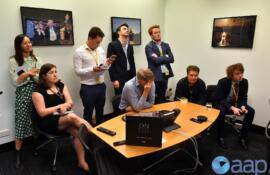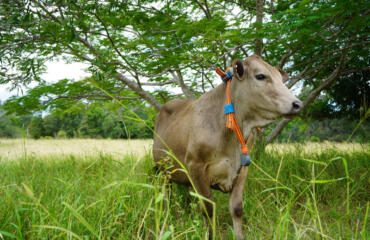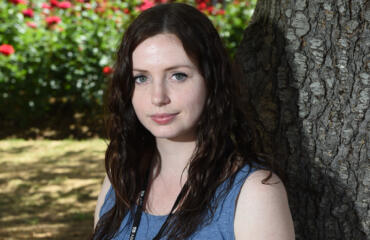Blink and you’d likely miss it – a big bin with a small sign inviting shoppers exiting Coles in Flemington to deposit their soft plastics for recycling. It’s not quite full, so it appears not many people have found it yet.
This innocuous-looking bin flags a new era in a drama that for a time captured headlines nationwide.
Two years ago, these bins – usually full to overflowing – were a familiar sight in supermarkets. That was until The Age revealed that the plastics, painstakingly returned for recycling by shoppers, had instead been piled high in warehouses across the country by REDcycle due to insufficient domestic processing capacity. An investigation into REDcycle by Victoria’s environmental watchdog revealed that 11,000 tonnes of stockpiled soft plastic had been stashed in 44 storage locations across the country.
Coles and Woolworths were shamed, environmentally conscious consumers felt betrayed, and government and recyclers were left scrambling to find a solution amid a skyrocketing supply but slumping processing capacity and manufacturing demand.

New soft plastics recycling bins making a quiet reappearance at Coles, Flemington. Photo: Georgie Preston.
This is why the reappearance of this bin in February, as part of a low-key trial by the big supermarket chains across 12 Melbourne supermarkets, is a big deal.
But does it really mark the beginning of a new functional era in Australia’s onshore soft plastic recycling capacity? So far, signals are mixed.
“There is a need and a want for it, so let’s hope it happens,” says Flemington local Chris Cane, who has been looking forward to having a soft plastic recycling service available through supermarkets again.
“I know of two people who have been filling cupboards or sheds with [plastic] for many months.”
Another avid local recycler, Rachael Vassallo, says that she put it in a lot of effort to separate her soft plastics for recycling before REDcycle’s collapse, introducing a specific new bin into her kitchen. “I don’t think I will trust supermarkets again considering how much they have let us down with the cost of living. I think the solution is to outright ban soft plastics and other single use items.”
The current trial, which quietly kicked off in mid-February after missing its original late-2023 deadline, is run by a group called the soft plastics taskforce that was established in the wake of REDcycle’s demise. The taskforce is made up of the three major supermarkets (Coles, Woolworths, and Aldi) and chaired by the Victorian government.
The supermarket bins are the first visible stage of the taskforce’s published roadmap, which aims over the next five years to resume consumer access to recycling through supermarkets, restore public confidence in soft plastics recycling and maximise the waste recovery through increased local capacity – working directly with recyclers instead of an intermediary like REDcycle.
The roadmap indicates supermarkets are also “working to reduce unnecessary plastics” in the first place. A Woolworths spokesperson told The Citizen that the company has removed more than 14,000 tonnes of virgin plastic from its range since 2018.
Under the plan, Australian-based waste facilities are expected to increase soft plastics processing capacity by around 15,000 tonnes per annum over the next few years, supported by government and industry investment. This is double the approximately 7,500 tonnes collected from REDcycle bins at Woolworths and Coles in the 12 months to July 2022 which are still to be fully processed.
While this signals an ambitious increase in processing capacity, it is dwarfed by the volume of soft plastics used in Australia per year, which the Australian Packaging Covenant Organisation (APCO) estimates to be about 538,000 tonnes.
This tower of refuse became a local problem only after China stopped accepting a wide range of waste in 2018, and the Australian government introduced a staged ban on exporting waste in 2020. Supermarkets now need government approvals to send stockpiles offshore, accelerating the need to develop better domestic processing capacity for soft plastics.
Recycling enterprise Close The Loop, a taskforce partner and the largest user of REDcycle plastic before the collapse, recently opened a new factory in Melbourne’s north that will soon be an operational soft plastics recycling facility. This is a big step since Close the Loop’s Melbourne plant had a fire in mid-2022, which took away a key recycling pathway used by REDcycle.
“We’re working as fast as we possibly can. We are using stockpiled materials to condition the line and will be in full production very soon,” says the company’s head of circular economy, Steve Morriss.
Several weeks into the trial, the company had yet to receive any new soft plastics collected in supermarkets.
The new plant will produce two types of products from soft plastics: an asphalt additive and an injection moulding grade of plastic which can be used to make products such as shopping baskets.
But Morriss admits that recycling soft plastics is difficult.
“The reason that nobody wants this stuff is because it’s extremely difficult to extract value from,” he says
“It includes many different materials. It’s not like recycling PET, which is just one material.”
PET is a type of plastic commonly used in products such as water bottles that can easily be recycled. In contrast, soft plastic items are made up of many kinds of plastics which cannot be easily melted down and recycled together.
Soft plastic packaging is also often paired with other materials, such as metal, which can damage recycling equipment. Morriss says that Close the Loop has installed an X-ray scanner in the new facility to rectify this issue.
Despite difficulties with scalability, Morriss says he is optimistic consumer confidence in domestic soft plastic recycling capacity will return. He says that the key lies in markets.
“Do Australian councils, state and federal governments and industry have the will to buy products of recycled content? Unless they do, nothing gets recycled. Collection and processing alone is not recycling.”
A spokesperson for APCO also says that end markets are vital, but that packaging sustainability means recycling via local supermarket bins needs to be seen as the final option, not a fix-all solution.
“Australian businesses and households need to look to the waste hierarchy and embrace … behaviours such as reduction, avoidance and reuse.”



